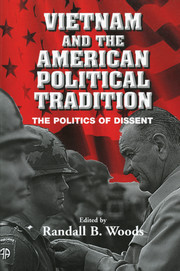Book contents
- Frontmatter
- Contents
- List of Contributors
- Introduction
- Anti-Imperialism in U.S. Foreign Relations
- World War II, Congress, and the Roots of Postwar American Foreign Policy
- The Progressive Dissent: Ernest Gruening and Vietnam
- “Come Home, America”: The Story of George McGovern
- Congress Must Draw the Line: Senator Frank Church and the Opposition to the Vietnam War and the Imperial Presidency
- Dixie's Dove: J. William Fulbright, the Vietnam War, and the American South
- Advice and Dissent: Mike Mansfield and the Vietnam War
- The Reluctant “Volunteer”: The Origins of Senator Albert A. Gore's Opposition to the Vietnam War
- A Delicate Balance: John Sherman Cooper and the Republican Opposition to the Vietnam War
- Friendly Fire: Lyndon Johnson and the Challenge to Containment
- Richard Nixon, Congress, and the War in Vietnam, 1969–1974
- Index
Anti-Imperialism in U.S. Foreign Relations
Published online by Cambridge University Press: 21 November 2009
- Frontmatter
- Contents
- List of Contributors
- Introduction
- Anti-Imperialism in U.S. Foreign Relations
- World War II, Congress, and the Roots of Postwar American Foreign Policy
- The Progressive Dissent: Ernest Gruening and Vietnam
- “Come Home, America”: The Story of George McGovern
- Congress Must Draw the Line: Senator Frank Church and the Opposition to the Vietnam War and the Imperial Presidency
- Dixie's Dove: J. William Fulbright, the Vietnam War, and the American South
- Advice and Dissent: Mike Mansfield and the Vietnam War
- The Reluctant “Volunteer”: The Origins of Senator Albert A. Gore's Opposition to the Vietnam War
- A Delicate Balance: John Sherman Cooper and the Republican Opposition to the Vietnam War
- Friendly Fire: Lyndon Johnson and the Challenge to Containment
- Richard Nixon, Congress, and the War in Vietnam, 1969–1974
- Index
Summary
What role has anti-imperialism played in U.S. foreign relations? While it is safe to say that it has been an important phenomenon, a more precise appraisal of its significance can come only from an historical understanding of its place among the nation's foreign policy traditions. At first sight, it would appear an easy matter to get a handle on this question, if only because the number of such traditions is quite small. Indeed, over the course of the past century, American foreign policy has been faced, broadly speaking, with only two abiding problems: imperialism and power politics. Because Americans have tended, with allowances for occasional lapses, to be opposed to both practices as a matter of principle, the short list of foreign policy paradigms narrows down rather quickly to two contenders: anti-imperialism and opposition to power politics.
Which to choose? Inasmuch as the two world wars and the cold war were great power conflicts, it seems clear that U.S. foreign policy in the twentieth century has been driven largely by geopolitical motives. It would seem fair to conclude, therefore, that anti-imperialism, however prominent on occasion, has on the whole played only a marginal role in the history of U.S. foreign relations. A parallel verdict would appear to be in order when evaluating the importance of anti-imperialism as a scholarly theme, for in academic writing geopolitics has clearly enjoyed privileged status among diplomatic historians and among specialists in international relations. QED: great power antagonisms have been the lead story.
- Type
- Chapter
- Information
- Vietnam and the American Political TraditionThe Politics of Dissent, pp. 12 - 41Publisher: Cambridge University PressPrint publication year: 2003
- 1
- Cited by



